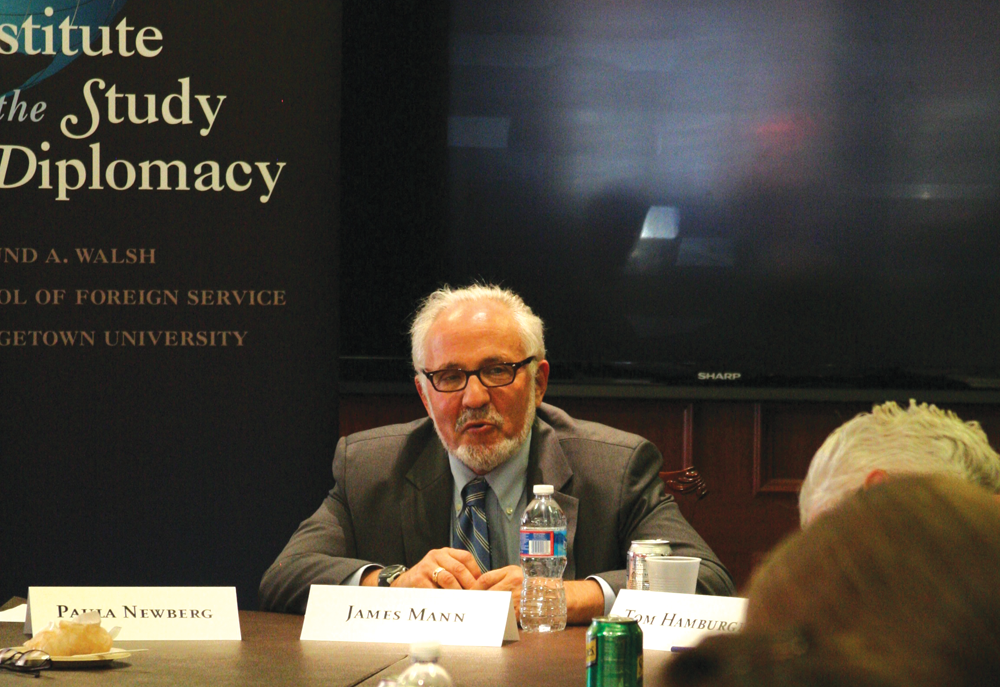
James Mann (pictured) and Tom Hamburger, both writers and former journalists, spoke about the fast-evolving dynamics of the presidential race at an event in the Mortara Center Tuesday.
Hamburger, a reporter for The Post’s national desk and a former writer for the Los Angeles Times, summarized the presidential campaign and explained why it has become a closer race in the most recent weeks.
“A few weeks ago, there was a feeling that Mitt Romney was so full of bombast and had been so successfully caricatured as a greedy titan of Wall Street, and the economic numbers were trending Barack Obama’s way, that political reporters began to wonder if the presidential election was really over — that we should put our attention more to Congressional races,” Hamburger said.
However, Hamburger noted that during the final month before the presidential election, there often is an October surprise, a pivotal development that occurs late in the race.
“This year, the October surprise was what some were referring to as the ‘Obama no-show’ in the [first] debate,” Hamburger said. “I think that the Obama performance in that debate contributed to what I would call a sense of unease.”
Hamburger argued that despite some signs of economic recovery, such as the drop in the national unemployment rate, there is still a sense of anxiety among Americans about the nation’s status internationally.
“It’s rather not a specific economic unease as much as a subtle and diffuse one that does relate to America’s place in the world,” he said.
According to Mann, an author-in-residence at the Johns Hopkins University School of Advanced International Studies, a former reporter for the Los Angeles Times and author of several books on politics and foreign policy, the renewed focus on international issues is a Romney campaign strategy.
“My own theory is that [Romney is] talking about foreign policy now as a stand-in for leadership,” Mann said. “He’s talking about these issues in a way that will show he is a strong leader, and people can then transfer [that idea] over to the economy.”
Mann added that domestic issues still hold sway with the electorate.
“I’m certain that the polls show that the public cares multiple times more about the domestic economy and jobs than it does about the consulate in Benghazi,” Mann said, referring to the attack on a U.S. diplomatic mission in Libya last month that killed American Ambassador Christopher Stevens.
Mann also spoke about his most recent book, “The Obamians, which explores President Obama’s prediction of the country’s long-term future. In his book, Mann divides the Obama campaign team into three different generations: the post-Vietnam generation, the post-Cold War generation of the 1990s, and the “Obamians” — those who came of age in the 2000s.
“The Obamians represent an effort to redo American strategy, to have a lighter footprint in the world, to no longer act assuming that America is and always will have a position of primacy in the world,” Mann said. “That the day will come when the United States is not necessarily the most powerful nation in the world, and … the country needs to start getting ready for it.”
Both speakers discussed the importance of China as a debate topic.
Mann noted that both President Obama and Secretary of State Hillary Clinton wanted to label China as a currency manipulator during their presidential campaigns in 2008 but did not follow through once in office.
“They took office, and they passed up one chance after another to do that because the belief was that China would take umbrage and there would be a trade war,” Mann said.
In Tuesday’s debate, Gov. Romney reiterated his promise to label China a currency manipulator. However, Mann challenged the effectiveness of his proposed action.
“What [Gov. Romney] doesn’t say is that actually, for all this talk from three candidates, declaring China a currency manipulator does not by itself change anything,” Mann said. “There is no action required as a result of declaring China a currency manipulator. Effectively, what Romney is saying is, ‘I won’t change anything, but I’ll stick it in China’s eye.’”
Hamburger linked the idea of China as a problem or threat to the concept of American unease.
“U.S. trade relations with China, as well as a fear of China as a risen power, reflect this concern about where we’re going,” he said. “The foreign policy issues that Romney is now raising … are an attempt to fire up this concern about America’s place in the world and also instill doubts about Obama’s ability to lead.”














